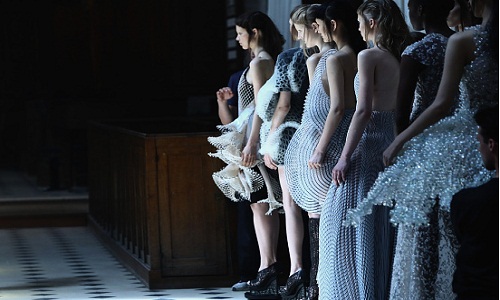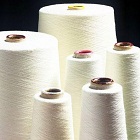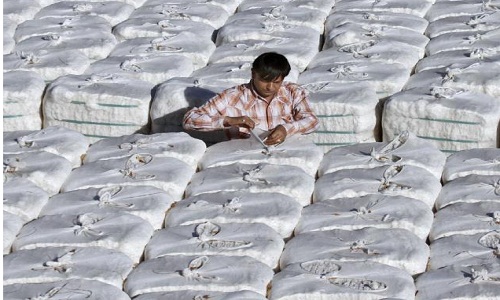FW

The fashion industry is always on the lookout for the latest technologies to maximise efficiency in production. Every day, new techniques are discovered and tested to address issues such as sustainability and the future of apparel related processes. While 3D printing is nothing new in the fashion world, the vast majority of designers have yet to explore the techy side of the industry.

Perhaps the notion that couture could be printed from a machine throws some people off. But several designers have already dispelled any theories or misconceptions there might be on the subject, successfully adopting the technology and adding printers into their workrooms. One such designer is Iris van Herpen. Never one to go with the flow, the Dutch innovator was one of the first to use a 3D printer for her clothes, transforming her Amsterdam studio into something resembling a laboratory to bring her ideas to life. Contemporary dresses come in all silhouettes, fabrics and lengths, as shown in the cutting-edge frock collection on Lyst that showcases styles for every occasion, though none quite compare to her silicone-made “dragon skin,” form-fitted and lined with cotton and silk. Van Herpen’s creations earned her a spot in the coveted Metropolitan Museum of Art in New York, in a previous exhibition known as Manus x Machina: Fashion in an Age of Technology.
Someone else who has shown a vested interest in this sort of wearable tech is Israeli designer Noa Raviv, a former student at the Shenkar College of Engineering and Design. Fascinated by the broken patterns produced by computers that don’t understand the inputted code, Raviv used that as a basis for the theme of her latest collection—tension between order and chaos. Her newest range is characterised by the looping lines and patterns incorporating Swarovski crystals.
Unlike van Herpen, her company only consists of one other person and is on the lookout for another, proving that you don’t need a large team of scientists to work the machines. With no factories manufacturing her clothes, together with the “mistake prints” that lay the foundation of her items, the dresses she currently retails in LA boutique H. Lorenzo are 100 percent unique.
Because of the amount of time and dedication each piece takes, 3D printing will most likely remain a practice only seen in the luxury fashion industry for the time being, although we never know what we have in store for the future.
"If you are offering good quality product at a reasonable price, then nothing can beat you in business. That has been proved by Kikani Exports time and again. Exporting yarns to Chinese companies for last 12 years, the company has understood the pulse of its customers well. Agreeing with the fact that exporting yarn to China is both a massive opportunity and a tremendous challenge, the company has been reaping fruits of hard work. Vrajesh Kikani, MD, Kikani Exports, says “The biggest difference between China and other export markets is the volume of business available."

If you are offering good quality product at a reasonable price, then nothing can beat you in business. That has been proved by Kikani Exports time and again. Exporting yarns to Chinese companies for last 12 years, the company has understood the pulse of its customers well. Agreeing with the fact that exporting yarn to China is both a massive opportunity and a tremendous challenge, the company has been reaping fruits of hard work. Vrajesh Kikani, MD, Kikani Exports, says “The biggest difference between China and other export markets is the volume of business available. In China, the volumes are huge. The company started exporting to China in 2004, with about 60 tonne per month. That increased over time to as much as 4,000 tonne per month by 2014 but in the past year, the market, owing to cautious market conditions, the volume has gone down to a level of around 2,000 tonne.”

Amid this volatility, China remains a crucial customer for Kikani and other suppliers from India, together withBangladesh representing about 60 per cent of total exports in some cases. He thinks the domestic market cannot take the big volume of Indian spinning mills and the industry, especially cotton spinning is an important industry which employs a lot of people. So, Indian companies need to be dependent on China for their growth.
Quality conscious company
Kikani’s experience in yarn trading has given them an upper hand in the competitive Chinese market. Quality management top of the list and it begins with sourcing the right yarns at the right price from reliable spinners along with the adoption of latest technology and process control. The company has a fully-equipped testing laboratory, with latest USTER technology for fibre and yarn quality assurance. The company trains staff regularly on the latest upgrades into the machinery to achieve the desired output.
Expansion process
Kikani recently invested in its own spinning mill to extend the options beyond its yarn trading business. The new mill, in Ahmedabad, started in 2015, expanding to 29,376 spindles and 4,320 TFO drums by the end of the year. Attractive incentives from state government helped the investment decision. The company’s in-house yarn production is combined with yarns from known and trusted spinners in India. A special advantage for knitting yarn is Kikani’s focus on Shankar 6, which is said to have the lowest contamination rate of the entire Indian crop – although still high compared with cottons from the USA or Australia.
Contamination is a serious issue and although it is generally ‘expected’ by spinners and their customers, there is a constant and growing need to monitor and control it. Kikani achieves this in its own spinning mill with a combination of latest USTER® JOSSI MAGIC EYE detection in the blow room and USTER® QUANTUM 3 (PP option) clearers on its winders. But contamination remains an inherent problem with Indian cotton, because of the typical farming practices in the cotton fields.
Kikani sells to major trading houses in China, and individual weaving and knitting companies and yarn dyers. Although the Chinese export business is large and important to Kikani, it is not usually as lucrative as sales in the domestic market, where prices are generally higher. However, the China trade offers greater volumes, and is mainly financed through letters of credit (LCs), which provides quicker payments compared to locally-negotiated deals with Indian customers.
Tough ride ahead…
Going ahead, Kikani expects market conditions to be more volatile, thereby majorly impacting business with China. Also because of increasing competition from Vietnam and other countries, the company feels it may be a dampener for Indian companies. Hence, unless Indian suppliers are extremely competitive, yarn sales to China will be an even greater challenge in the days to come.
US outdoor apparel maker Timberland has released its Q3 2016 Corporate Social Responsibility (CSR) performance data. The figures have been broken down by the three CSR goals of product, outdoors, and community. The data shows that in Q3, 69 per cent of all cotton used in Timberland apparel was either organic, of US-origin or Better Cotton Initiative certified.
Meanwhile, Timberland's average use of volatile organic compounds was 54 grams per pair of shoes while 91.6 per cent of Timberland's overall leather volume came from tanneries that have a Silver or Gold rating by the Leather Working Group, a multi-stakeholder group, comprising of brands, retailers, leather manufacturers, chemical companies and other relevant parties in the leather supply chain with the goal of raising the environmental performance of the leather industry.
Timberland sourced from 349 factories in Q3. In terms of outdoors, Timberland has aligned future targets with the goals of its parent company VF Corporation around energy reduction and renewable energy.
Timberland has set itself a number of other ambitious sustainability targets which it aims to achieve by 2020. These include having 100 per cent of footwear including at least one material containing recycled, organic or renewable (ROR) content; to have 100 per cent of footwear and outerwear leather sourced from tanneries that have earned a Gold or Silver rating from the Leather Working Group; for 100 per cent of apparel cotton to come from organic, US-origin or Better Cotton Initiative–certified sources; and for 100 per cent of footwear and apparel to be PVC-free.
Myanmar has a long way to go for its garment industry to be sustainable. Factory workers, most of whom are women, bear the brunt of an extremely competitive global market in which labor standards remain below internationally recognised human rights and labor standards.
About 95 per cent of workers are on the job six days a week while 88 per cent work 10 or more hours a day. Most face disproportionate wage deductions for taking days off. Trade unions exist in just a third of the factories while just eight per cent of the workers are members of a trade union. Even after the introduction of the minimum wage policy, two thirds of workers say working conditions have become harsher both in terms of expected worker output and strict regulations.
It’s clear that further systemic changes are needed for a more sustainable fashion future. In this context brands like H&M are taking the lead in bringing all the relevant actors together to get closer to making functional industrial relations and collective bargaining a reality in the fashion supply chain.
However the garment industry in Myanmar, while still small compared to major producers such as China and Bangladesh, is growing exponentially, as more and more buyers source from the over 350 factories in its industrial zones.
Telangana will open 12 new textile clusters. This is part of a move to encourage handlooms and support weavers. A textile policy will contain several welfare measures for weavers' benefit. Handloom workers in the parks will be provided health insurance and pension facilities.
Handloom products will be provided outlets. Weavers would be empowered through enhanced marketing opportunities and better incomes. For speedy revival of the handloom industry, and for giving a boost to the workers, the budget would allot special funds. Workers who are dependent on power looms for livelihood have been granted a loan waiver.
Public representatives and officials will be urged to wear handloom clothes at least once a week. Online sales of handloom clothes have already taken off and these would be taken to all e-commerce websites.
Telangana is one of the important states in the handloom industry. There are about 82,435 handloom weavers in the cooperative fold and 32,002 outside the cooperative fold. The handloom industry in Telangana is known for pochampally ikats, gadwala cotton, silk and sico saris, Narayanpet cotton, men’s shirts, silk saris, dress materials, stoles, Warangal durries, Karimnagar bed sheets and furnishings. The Telangana State Handloom Weavers Cooperative Society was established in 2016.
For over 60 years, Leister has been the global market leader for welding thermoplastic polymers and hot-air modules for industrial process heat applications. Leister is working on a laser seam welder, especially for garment manufacturing, which can be used almost like a normal sewing machine.
The company is conducting a field study. The aim is to figure out if the end customer is satisfied with laser welded seams and to prove the skin friendliness and durability of laser seams. In the study, subjects wear laser welded sports bras when involved in physical activities such as playing handball, running and attending fitness classes. Participants prefer the comfort of laser welded apparel in comparison to sewn apparel.
Laser welding itself is a brand new technology not currently employed in the industrial production of garment manufacturing. Some of the potential benefits of laser textile welding include flat, elastic and skin-friendly seams. Through the use of laser welding it’s possible to achieve a seamless effect and the outside of the fabric is not harmed at all. Laser seams are smooth and gentle; therefore it is best for clothing that comes in direct contact with the skin as there is no irritation.
Huntsman Textile Effects has entered into a collaboration with Viyellatex. Huntsman will support Viyellatex’s mills to streamline operations and optimise processes, train technical staff, and make recommendations to help improve yield and productivity. The agreement is expected to help Viyellatex maintain its edge in the textile industry by leveraging Huntsman's R&D capabilities, innovation and focus on sustainability.
Viyellatex is a group of vertically integrated textile manufacturing companies in Bangladesh. It places strong emphasis on sustainability by minimising energy use, adopting waste and water recycling, and using only organic materials and environmentally compliant chemicals and dyes.
Huntsman, based in Switzerland, is a dyes and chemicals company. It provides high quality dyes and chemicals to the textile and related industries, manufacturing a broad range of dyes and chemical products that enhance the color of finished textiles and improve performance characteristics, such as wrinkle resistance, lasting freshness and the ability to repel water and stains. The business currently serves over 4,500 customers located in 80 countries. Its operating companies manufacture products for a variety of industries.
Bangladesh’s readymade garment sector was worth $28.1 billion in 2015-16, with more than 4,300 garment factories employing about four million people and accounting for 82 per cent of the country's total exports.
The textile and garment industry is among the rising sectors in Ethiopia. The country has easy access to the international value chain and has an abundant and workforce. Different incentives have been given to foreign investors and local small scale and medium textile and garment associations to encourage the sector. Small and medium industries have been given support in terms of structure, training, workshops, loans, machinery lease, finance, advice services, market linkages and the like.
The Textile Industry Development Institute provides chemical and environmental laboratory facilities, spinning, garment technology, weaving, knitting and training. The number of middle and higher industries of the sector has currently reached 161. Textile exports have grown from 0.9 to 3.8 per cent during 1990 to 1998.
Major challenges are: lack of inputs, skilled man power, and obsolete technologies. The sector needs committed and modern management systems to raise small industries’ baselines higher. Investors need to be briefed on the sector’s prospects and textile exports sector needs to be pushed. Its employment potential is being enhanced. The sector is expected to create more than 3,00,000 jobs during the plan period. Small and medium textile and garment industries are being given capacity building programs.
Eclat Textile, Taiwan’s largest technology-based textile company, professional functional and flexible knitwear fabric producer and apparel manufacturer is completely closing down its Chinese manufacturing base in the city of Wuxi. The company cited deteriorating investment conditions and surging wages as a cause for this move.
Roger Lo, Eclat's VP, says in the last three years, their Chinese site continued to lose money and that is the reason they don't see any way to turn that situation around in the future. The most challenging aspects of doing business in China have been not only rising wages but also the difficulty of finding employees who would want to work in a garment factory under the nation's previous one-child policy. The Taiwanese company has been gradually scaling down the Chinese factory's capacity this year. The Wuxi facility once accounted for about 5 per cent of Eclat's monthly output but now produces only 1.8 per cent of the 6.2 million clothes the company churns out.
Meanwhile, Eclat aims to continue building its presence in Vietnam where it plans to add two new facilities in the first and third quarters of 2017 with a combined capacity for 1.3 million more garments. Nearly 70 per cent of the company's clothes production and half of its fabrics output have been coming from the Southeast Asian nation. Eclat is not the only Taiwanese company looking to make a move out of China. Pou Chen, the world's largest shoemaker and a supplier to brands including Nike and Adidas, is also boosting its output in Southeast Asian countries to reduce its reliance on China.
Sweden’s fashion companies have a social conscience and are acutely aware of how their business can affect both the environment and the people working in it.
For example, Silversmith Sofia Holpp doesn’t do any sketching on paper. She conceptualises her designs in her mind before creating a prototype. After production, all metal waste is collected and sent back to the wholesaler for recycling, and she has also located manufacturing close to the point of sale to keep Holpp’s carbon footprint down. In the future the plan is to set up local production centers outside of Europe, so the jewelry has to travel as short a distance as possible to its destination.
Bukvy is a five-in-one bag brand. It transforms with the help of zips and straps, negating the need for a separate accessory for each occasion. The practical but stylish bag lasts for years. And if a strap wears out, Bukvy can replace it to make it last even longer. The bag is made of 100 per cent vegetable tanned leather than the commonly used method involving chrome.
Denim maker Lindex uses organic cotton. Sustainable methods reduce the use of water, chemicals and energy. Even swing tags, buttons and zippers are made from organic or sustainable materials wherever possible.












